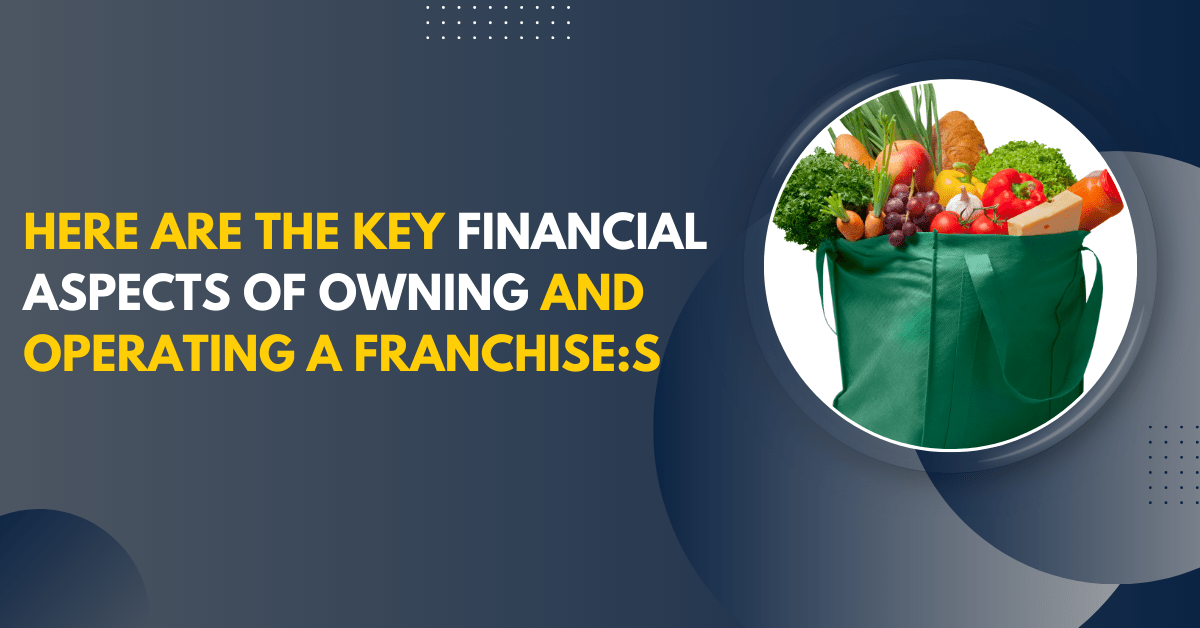Financial Aspects of Owning and Operating a Franchise
Owning a franchise is always considered as the great way to achieve business success without starting from scratch. The idea is interesting: you get to run your own business while benefiting from an established brand’s reputation and support system. However, before diving into franchise ownership, it’s crucial to understand the financial aspects involved. From initial investment costs to ongoing fees and potential profits, this blog will guide you about the financial aspects of owning and operating a franchise.
Here Are The Key Financial Aspects Of Owning And Operating A Franchise:

Initial Investment Costs:
The initial investment is the first major financial problem you’ll face. This investment can change significantly depending on the franchise, ranging from a few thousand dollars to several million.
The initial investment typically includes:
- Franchise Fee: This is a one-time fee paid to the franchisor for the rights to operate under their brand. Franchise fees can range from $10,000 to $50,000 or more.
- Initial Inventory: You’ll need to stock your new business with the necessary products or supplies to get started. This cost can change widely based on the type of franchise.
- Equipment and Fixtures: Depending on the franchise, you may need specific equipment, such as kitchen appliances for a restaurant or specialized machinery for a fitness center.
- Real Estate: Whether you’re renting or buying, securing a location for your franchise can be a significant expense. This includes lease deposits, down payments, and construction or renovation costs.
- Training Cost: Many franchises require you to undergo training before you can start operations. This can include travel, accommodation, and other related expenses.
- Marketing and Advertising: Initial marketing campaigns to promote your grand opening and attract customers can be costly.
Ongoing Fees:
Once you’ve paid the initial investment and started operations, there are ongoing fees to consider. These costs are crucial to budget for, as they will affect your business growth and profitability. Some most common ongoing fees include:
- Royalty Fees: These are regular payments made to the franchisor, according to the percentage of your gross sales. Royalty fees usually range from 4% to 12%.
- Marketing Fees: Many franchises require contributions to a national or regional marketing fund. This fee is also often a percentage of your gross sales, typically around 1% to 4%.
- Technology Fees: Some franchises charge fees for technology support, software, or system maintenance.
- Supplies and Inventory: Regular restocking of inventory and supplies is necessary to keep your business running smoothly.
- Operational Cost: These include utilities, rent, salaries, and other day-to-day expenses essential to run the business.
Financing Your Franchise:
Due to the significant financial requirements, many franchise owners opt for financing options to cover costs. Here are a few common options:
- Personal Savings: Using your own savings is the most common way to finance your franchise, but it requires you to have huge amount of funds available.
- Bank Loans: Traditional bank loans are a popular and common option. However to get a loan, you’ll need a strong Cibil score and a solid business plan.
- Small Business Loans: There are so many business administrations that offer loans specifically for franchisees. These loans often have favorable terms but require a complete the application process. The process is not quite difficult and doesn’t require much documentation hence you can easily take loan. All you need to do is to connect with an administration and apply for a loan.
- Franchisor Financing: There are so many successful franchisors that provide financing options to help new franchisees to involve in franchise business. They also offer special programs to new businesses to grow and achieve success. These programs are not attractive due to their familiarity with the pre-operated business model.
- Investors: Bringing in investors is also a best way to cover financial cost. This can provide the necessary capital in exchange for equity or a share of the profits.
Potential Earnings and Profitability:
Before making an investment, it is crucial to understand the potential earnings and profitability of a franchise. Profitability can vary widely based on several factors:
- Industry: Some industries are more profitable than others. For example, fast food franchises often have lower profit margins compared to service-based franchises. Hence we can say that the profitability is depend on the profitability.
- Location: A prime location with high foot traffic and demand plays a crucial role in taking your earnings to the next level. However, prime locations often come with higher real estate costs. So if you are a beginner and has small budget, then you can go for local areas to setup a franchise.
- Management: Effective management plays an important role in the success of a franchise. Strong leadership and good business practices can lead profitability. So, before owning and operating a franchise, it’s crucial to focus on proper management.
- Brand Strength: Well-established brands with strong customer support can lead to higher sales and better profit margins. Hence we can say that brand strength is crucial. So, if you are planning to own a franchise then try to invest in franchise with brand strength.
- Market Conditions: Economic conditions, competition, and market trends also impacts your franchise’s performance. So always focus on market conditions to improve the profitability.
Break-Even Point:
The break-even point is the stage at which your franchise’s revenues and expenses are equal. Reaching this point is a critical milestone, as it means your business is no longer operating at a loss. Calculating the break-even point involves understanding both fixed and variable costs and projecting your sales. This analysis will help you set realistic financial goals and timelines.
Financial Planning and Management:
Effective financial planning and management are essential for the long-term success of your franchise. Here are some tips to help you stay on top of your finances:
- Create a Detailed Business Plan: you should create a plan of your financial goals, strategies for achieving them, and a timeline for key milestones. This plan should include various statements such as projected income statements, cash flow statements, and balance sheets.
- Monitor Cash Flow: You should track your cash flow everyday to ensure you have enough cash to cover expenses and avoid financial issues.
- Budget Wisely: You should prepare a budget that contains all expenses, including unexpected costs. So try to stick to your budget to avoid unnecessary expenses.
- Invest in Accounting Software: Reliable accounting software proves helpful in keeping accurate financial records and streamline financial reporting. So you should invest in accounting software to generate to manage finances.
- Consult with Professionals: You should work with financial advisors, accountants, and other professionals to get valuable insights and guidance.
Risk Management:
Financial aspects of owning and operating a franchise– Like any business venture, owning a franchise also comes with risks. Managing these risks is vital to protecting your investment and ensuring long-term success. Key risk management strategies include:
- Divide Income Streams: If possible, divide your income sources to reduce dependency on a single source of income.
- Maintain Adequate Insurance: Ensure you have the appropriate insurance coverage to protect against potential risks, such as property damage, liability, and business interruption.
- Keep an Emergency Fund: Keep emergency funds to cover unexpected expenses or economic fall. This can help you to combat tough times without putting your business on risk.
- Stay Informed: It is essential to stay tune with industry trends, market conditions, and changes in regulations that can affect your business.
Exit Strategy:
Finally, it’s essential to have an exit strategy in place. Whether you plan to sell your franchise, pass it on to a family member, or eventually retire, having a clear plan can help you maximize the value of your investment. Consider the following when developing your exit strategy:
- Valuation: You should understand how to value your franchise properly. This involves managing your financial statements, market conditions, and the overall health of your business. So always consider the valuation while preparing your exit plan.
- Success Planning: If you are planning to pass your franchise to a family member or employee, ensure they are adequately trained and are ready to take and run it properly.
- Selling Your Franchise: If you are planning to sell, work with a broker or advisor to find qualified buyers and negotiate favorable terms.
- Legal Considerations: Ensure you comply with all legal requirements and franchisor agreements when transferring ownership.
Conclusion:
Owning a franchise can be a rewarding business venture, offering the opportunity to be your own boss while enjoying an established brand. However, it’s crucial to understand the financial aspects of owning and operating a franchise. From initial investment costs and ongoing fees to potential earnings and risk management, being well-informed and financially prepared is key to your success as a franchise owner. By carefully considering these financial factors and planning accordingly, you can make informed decisions and set yourself up for long-term success in the world of franchising.
Hope this guide helps you in knowing the financial aspects of owning and operating a franchise. If you want to know more about franchise then visit our site.
Thanks for reading!
ALSO READ : Examine The Impact of Technological Advancements on Supermarket Operations
